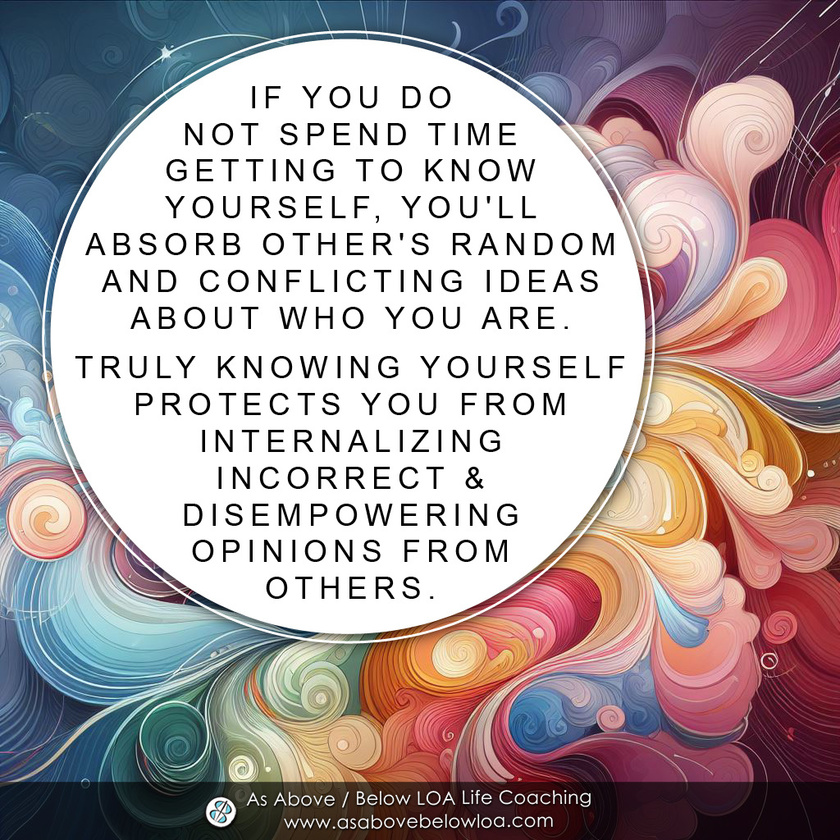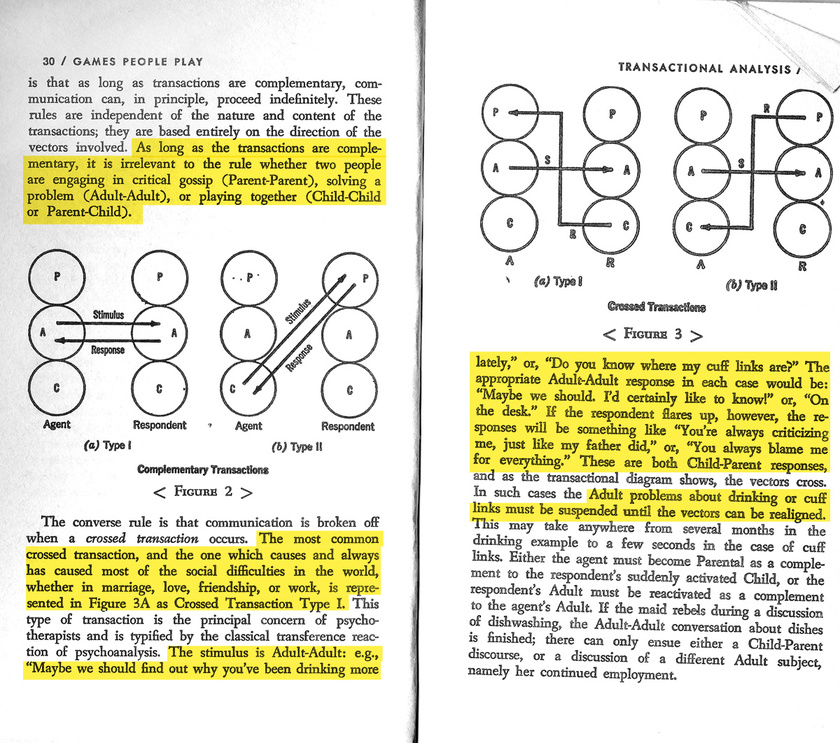
Your thoughts create what you see in the world. Learn how to change your thoughts in order to change your world. You can have a wonderful, fun-filled life. But we all have some limiting beliefs keeping us from enjoying life. This group is meant to uplift and help people feel powerful over their life again.
You can learn more about me and the law of attraction at my website: https://asabovebelowloa.com/
Whenever we are conversing with others we're coming from a standpoint of our inner child, adult self, or in a form of a parent. In a perfect world we'd be interacting as adults to other adults, or in a kindly parental way with children (or even someone who is feeling vulnerable like a child in the moment). It's also okay to have fun like a child with another adult having fun like a child.
Each mental state has pros and cons. It's okay to be like a loving parent to someone in need, but the opposite mode is acting like a strict parent punishing a child. Having fun like a child is useful at times, but acting like a spoiled child and throwing tantrums is not.
I don't want to get into the nitty gritty of the two books in the images, Games People Play by Eric Berne, MD and I'm OK, You're OK by Thomas Harris MD. They're more in depth. You can read up on it if you wish.
But I wanted to talk about our conversations in the political sphere these days. Too often you will try to have an adult conversation with someone, and you'll just get a logical fallacy back (strawman or ad hominem). "Why won't those people discuss things logically on the facts like adults?" you might think.
In those moments you're experiencing a crossed (conversational) transaction with them. You thought you were entering into an adult conversation.
However, the subject that you brought up has triggered an unhealed emotional wound in the other person. That other person then can label you as the "persecutor" in the drama triangle. They don't want to take personal responsibility for why they got emotionally triggered, so it's easier to project and shift the blame onto you.
They may take on the savior role (parental role) wanting to punish you the "persecutor" (in their mind). Or they may take on the victim role (child role) and throw a temper tantrum. When they take on the parental role, they want you to be the child they're punishing, and when they take on the child role, they want you to be the parent they're pissed at.
Notice they don't want you to be an adult. That's why this is a crossed (conversational) transaction. You were trying to have an adult-adult conversation. They don't see you that way.
A quote from Games People Play (pictured for context), "In such cases the Adult problems about drinking or cuff links must be suspended until the vectors can be realigned. This may take anywhere from several months in the drinking example to a few seconds in the case of the cuff links. Either the agent must become Parental as a compliment to the respondent's suddenly activated Child, or the respondent's Adult must be reactivated as a complement to the agent's Adult.
If the maid rebels during a discussion of dishwashing, the Adult-Adult conversation about dishes is finished; there can only ensue either a Child-Parent discourse, or a discussion of a different Adult subject, namely her continued employment."
I theorize this is going on everywhere on a large scale. For one thing, the school teachers who want to teach children about gender/CRT against the students' parents' wishes. The teachers have a job (to teach what parents want taught), and they're acting spoiled when the students' parents' get upset with this.
I wrote an article about how we need to enforce our boundaries: https://asabovebelowloa.com/should-you-take-the-beating-or-defend-your-boundaries
What's going on right now are a lot of people acting like spoiled children and they are situating adults into the position of having to take on the parent role (become an enforcer of boundaries). Some are enforcing their boundaries, while others are acting more like the strict parent trying to punish children, or acting childish themselves.
If you understand this, I bet you will see it in every interaction. It's honestly everywhere. But I wanted to write about it, so you can see when someone is playing games like this. It's okay to walk away when someone is acting like a child or trying to act like a strict parent.
The more you recognize this, the less you will get pulled into the drama.
Check out the images I've attached and you can research games people play for more information.
Do you have some examples of this in your own life you'd like to share? Feel free to comment below. I'd be interested in hearing from you and see if this made sense to you all.
Your experiences of the world are not always a reflection of reality. Your brain has to make decisions of what to focus on, & THAT is what you perceive. Your perception is not always correct because it's not built on all data. So question what you believe. "Is it true ?"
#perception #perceptions
Oftentimes on social media users will make "social comparisons." They see what other people are doing or looking like in their photos and think, "I wish I had that" or "I wish I looked like that." It's the "grass is always greener on the other side" type thinking.
Most people don't post the times when they don't look their best or when they're sick. Married couples don't post all the times they get into fights. It's easy for someone single to look at happy couple pictures on a timeline and think they'd feel better "if only they met someone."
Females may see made-up women or just filters like the ones in the video/article and feel self-conscious about their own looks. Males may see men with hard abs and wish they looked like that too. Check out the link to see how quickly some different poses and lighting can change your abs. https://www.eviemagazine.com/post/influencer-josephine-livin-reveals-truth-face-filters-body-morphing-tricks
We often miswant what others are showing on social media. I ...
If someone is criticizing you, you should ask, “Is it true?”
If it’s true, then there’s something you can do (work on it). But if it’s not true, why spend time worrying about their incorrect beliefs?
Many children internalize the criticisms they receive when younger. Some things may have been true, but they blew them up into larger problems than they were. Some critiques are just plain wrong (from people projecting their own issues onto the child).
It’s our responsibility to check to see if something is true or not. Otherwise, we’ll live a whole life thinking incorrect things about who we are.
Know Thyself.

Some misunderstand getting prayers answered or manifesting things and think it’s too easy so it must be incorrect. And they’ll ignorantly make fun of Christianity or the Law of Attraction belief that you can simply “Ask & Receive.” Of course, that comes from simplifying the belief down so much that it makes it incorrect.
In this article I discuss the caveats to getting what you ask for from both the Christian perspective and Law of Attraction perspective.
https://lawofattraction.substack.com/p/limitations-of-ask-and-you-will-receive?sd=pf
We all have limiting beliefs that can distort our view of reality. Because I deal with questioning beliefs, I more easily recognized these limiting beliefs in the "woke." I discuss how having limiting beliefs is like going through life with distorting glasses on in this article:
https://dramaofitall.substack.com/p/seeing-through-distorted-lenses
I also share a few things from James Lindsay (newdiscourses.locals.com) if you'd like to learn more about this from a slightly different perspective than mine.

















